De Nederlandse dichteres en beeldend kunstenares Marije Langelaar werd geboren op 18 juni 1978 in Goes. Zie ook alle tags voor Marije Langelaar op dit blog.
Vrij
Hier is het donker, lawine, golf, grot.
Sinds een week of twee heb ik mij met de grootst mogelijke
concentratie naar de stad toe bewogen en nu lig ik hier voor een
uit steen gehouwen kade waarop illuminiserend licht valt.
Naast mij een dier,zo weinig opmerkzaam,zijn hartslag rilt
obsceen tegen mij aan.In die korte momenten waarin ik helder
ben vraag ik mij af: ben ik een wezenlijk deel van de rivier?
Wanneer ik ontsnap zal zij dan sterven? Is het de bedoeling dat ik
ontsnap? Zijn er daar soortgenoten? Kan ik daar leven en ben ik
daar eerder geweest?
Ik word korzelig van al die vragen –
terugzinken in de diepte tussen de makaziplanten of eruit kruipen?
Iets moet gebeuren,zodat ik mijn nek,wervels,tong
schrap zet alles doordrenk van mijn wilskracht uit het zwart te
geraken,ik zing wanneer ik door de buis door de adem door
de vlijmscherpe haken alles zo nauw en gevaarlijk maar ik zing
en gevaarlijk vrij op de grond stort
Stad
Op hoeven draaft de stad de nacht door
lange teugels om gebouwen zweepslagen op het plein
van opwinding luiden de klokken
bakstenen laten hun greep los
fietsen ratelen de straat op, fornuizen. Genoeg.
De stad strijkt neer bij een oever
door het rinkelen en gongen ontwaken de vissen
glad en radeloos
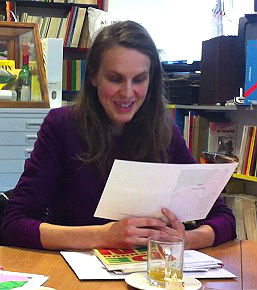
De Amerikaanse schrijver Richard Powers werd geboren op 18 juni 1957 in Evanston, Illinois. Zie ook alle tags voor Richard Powers op dit blog.
Uit: Tot in de hemel (Vertaald door Jelle Noorman)
“Het staatsburgerschap wekt honger naar de onontgonnen wereld. De twee pakken hun roerend goed bijeen en beginnen aan de landreis over de uitgestrekte, met weymouthdennen overdekte vlakten, via de donkere beukenwouden van Ohio, door de opener eikenbossen van het Middenwesten, helemaal naar de nederzetting bij Fort Des Moines in de nieuwe staat Iowa, waar de overheid land dat nog maar gisteren werd verkaveld weggeeft aan eenieder die het bewerken wil. Hun naaste buren wonen twee mijl verderop.
Dat eerste jaar beploegen en beplanten ze zo’n vijftig acres. Mais, aardappelen en bonen. Ze werken bikkelhard, maar voor zichzelf. Beter dan marineschepen bouwen voor welk natie dan ook.
Dan volgt de prairiewinter. De kou knaagt aan hun levenswil. In de blokhut vol kieren daalt hun bloed “s nachts naar het nulpunt.
Elke morgen moeten ze een wak slaan in de waskom om ten minste hun gezicht af te spoelen. Maar ze zijn jong, vrij en gedreven – de enige stutten van hun eigen bestaan. De winter krijgt hen er niet
onder. Nog niet. De zwartste wanhoop in hun hart wordt samengeperst tot diamant.
Wanneer het opnieuw tijd is om te planten, is Vi in verwachting. Hoel drukt zijn oor tegen haar buik. Ze moet lachen om zijn van ontzag vertrokken gezicht.‘Wat zegt het?’
Hij antwoordt in zijn hoekige, bonkige Engels‘Voed me!’
In mei dat jaar ontdekt Hoel zes kastanjes in een zak van de kiel die hij droeg op de dag dat hij zijn vrouw ten huwelijk vroeg. Hij duwt ze in de aarde van West-Iowa, op de boomloze prairie rond
de blokhut. De boerderij is honderden mijlen verwijderd van de natuurlijke habitat van de kastanje en duizend mijl van de kastanjefestijnen van Prospect Hill. Met elke maand die verstrijkt, kost
het Hoel meer moeite ze zich voor de geest te halen, die groene wouden in het oosten.
Maar dit is Amerika, waar mens en boom de wonderbaarlijkste omzwervingen maken. Hoel plant, begiet en denkt: Op een dag zullen mijn kinderen aan de stammen schudden en gratis kunnen eten.
Hun eerstgeborene sterft als zuigeling, gedood door iets wat nog geen naam heeft. Microben bestaan nog niet. God is de enige die kinderen wegneemt en zelfs, met ondoorgrondelijke regelmaat,
tijdelijke zielen meegrist van de ene wereld naar de ander.”
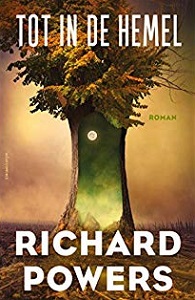
Cover
De Franse schrijver Raymond Radiguet werd geboren op 18 juni 1903 in Saint-Maur-des-Fossés. Zie ook alle tags voor Raymond Radiguet op dit blog.
Uit: Le diable au corps
« Tandis que ma tante parlait d’une amie enfuie dès les premiers jours, après avoir enterré dans son jardin des pendules, des boîtes de sardines, je demandai à mon père le moyen d’emporter nos vieux livres ; c’est ce qu’il me coûtait le plus de perdre. Enfin, au moment où nous nous apprêtions à la fuite, les journaux nous apprirent que c’était inutile. Mes soeurs, maintenant, allaient à j… porter des paniers de poires aux blessés. Elles avaient découvert un dédommagement, médiocre il est vrai, à tous leurs beaux projets écroulés. Quand elles arrivaient à J…, les paniers étaient presque vides ! Je devais entrer au lycée Henri IV ; mais mon père préféra me garder encore un an à la campagne. Ma seule distraction de ce morne hiver fut de courir chez notre marchande de journaux, pour être sûr d’avoir un exemplaire du Mot, journal qui me plaisait et paraissait le samedi. Ce jour-là je n’étais jamais levé tard. Mais le printemps arriva, qu’égayèrent mes premières incartades. Sous prétexte de quêtes, ce printemps, plusieurs fois, je me promenai, endimanché, une jeune personne à ma droite. Je tenais le tronc ; elle, la corbeille d’insignes. Dès la seconde quête, des confrères m’apprirent à profiter de ces journées libres où l’on me jetait dans les bras d’une petite fille. Dès lors, nous nous empressions de recueillir, le matin, le plus d’argent possible, remettions à midi notre récolte à la dame patron esse et allions toute la journée polissonner sur les coteaux de Chennevières. Pour la première fois, j’eus un ami. J’aimais à quêter avec sa soeur. Pour la première fois, je m’entendais avec un garçon aussi précoce que moi, admirant même sa beauté, son effronterie. Notre mépris commun pour ceux de notre âge nous rapprochait encore. Nous seuls, nous jugions capables de comprendre les choses ; et, enfin, nous seuls nous trouvions dignes des femmes. Nous nous croyions des hommes. Par chance nous n’allions pas être séparés. René allait déjà au lycée Henri IV, et je serais dans sa classe, en troisième. Il ne devait pas apprendre le grec ; il me fit cet extrême sacrifice de convaincre ses parents de le lui laisser apprendre. Ainsi nous serions toujours ensemble. Comme il n’avait pas fait sa première année, c’était s’obliger à des répétitions particulières. Les parents de René n’y comprirent rien, qui, l’année précédente, devant ses supplications, avaient consenti à ce qu’il n’étudiât pas le grec. Ils y virent l’effet de ma bonne influence, et, s’ils supportaient ses autres camarades, j’étais, du moins, le seul ami qu’ils approuvassent. Pour la première fois, nul jour des vacances de cette année ne me fut pesant. »
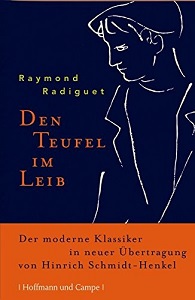
Cover Duitse uitgave
De Engelse dichter Geoffrey Hill werd geboren op 18 juni 1932 in Bromsgrove, Worcestershire. Zie ook alle tags voor Geoffrey Hill op dit blog.
Funeral Music
5
As with torches we go, at wild Christmas,
When we revel in our atonement
Through thirty feasts of unction and slaughter,
What is that but the soul’s winter sleep?
So many things rest under consummate
Justice as though trumpets purified law,
Spikenard were the real essence of remorse.
The sky gathers up darkness. When we chant
‘Ora, ora pro nobis’ it is not
Seraphs who descend to pity but ourselves.
Those righteously-accused those vengeful
Racked on articulate looms indulge us
With lingering shows of pain, a flagrant
Tenderness of the damned for their own flesh:
6
My little son, when you could command marvels
Without mercy, outstare the wearisome
Dragon of sleep, I rejoiced above all—
A stranger well-received in your kingdom.
On those pristine fields I saw humankind
As it was named by the Father; fabulous
Beasts rearing in stillness to be blessed.
The world’s real cries reached there, turbulence
From remote storms, rumour of solitudes,
A composed mystery. And so it ends.
Some parch for what they were; others are made
Blind to all but one vision, their necessity
To be reconciled. I believe in my
Abandonment, since it is what I have.
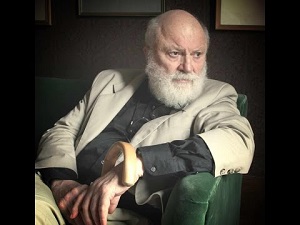
De Nederlandse schrijver en dichter Bert Schierbeek werd geboren op 18 juni 1918 in Glanerbrug in Twente. Zie ook alle tags voor Bert Schierbeek op dit blog.
Uit: Weerwerk (Fragment)
denk je: dit is de aanloop
een eerste ademtocht
geen woord te vinden
om het uit te drukken
de eerste abstraktie van
die grote gele groene en bruine
vlakken en de sloten en het kanaal
er doorheen
een vlek vol vlekken
roep ik: trekt de schara voorbij
beneden platgeslagen in
zijn eigen spiegel
geel gezicht en doorrimpeld
vroeger rivieren en wouden
vol olifanten en reden de
jagers in tweewielige wagens
en schoten maar raak
kijk ik uit de kap van de molen
van Schiphoes en zie het dak
van de zolder van Oma waar de
aanstaande man van Totje Nachenus
zich ophing twee uur voor de bruiloft
en Totje het lijk sloeg en riep
jij loeder
doe deugnait
waarom
en Oma dan zegt heel kalm
aan deze haak hing ie
Opa haalde hem los
maar was dood

Op de cover van de Parelduiker
De Duitse dichteres Karin Fellner werd geboren op 18 juni 1970 in München. Zie ook alle tags voor Karin Fellner op dit blog.
das licht dimmt langsam weg
/ die mauern halten fest
hinter glas bleibt er fremd / bär mit zerzausten augen
verausgabt in einem kampf / der nicht zu gewinnen ist
abgehalftert vertanzt
mahlt er kinnbacken ihm
klebt die welt an den fersen / das beste er setzt sich drauf
wer hat das programm gemacht / wer hat es in szene gesetzt
müde hebt er nicht
tatzen mehr nur lider
Futter I
hüllen sie sich in stimmen / nieseln auf geköpfte
platanen über pfützen / geduckte passanten
sie sitzen
an der theke, pastis / mahlen maschinen francs
spannen gerüchte aus / steigen auf pyrenäen
schlürfen sie
kaffee, sind helden von
vagem mut, ziehen los.
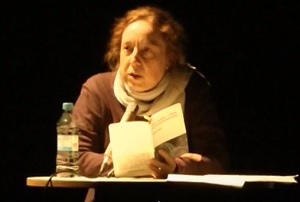
De Vlaamse schrijver Aster Berkhof (eig. Louis van den Bergh werd geboren in Rijkevorsel op 18 juni 1920. Zie ook alle tags voor Aster Berkhof op dit blog.
Uit Toen wij allen samen waren
‘Moeder
hield er niet van dat in ons huis over “het gemeen volk” gesproken
werd. Met gemeen volk bedoelde ze de fabrieksarbeiders. Het “goed volk”
bestond uit de adel, de burgerij en de boeren. Hoewel de boeren ook met
de handen werkten, was er voor haar geen enkele overeenkomst tussen hen
en de arbeiders. Een boer bezat een hoeve. Hij bezat dieren en
werktuigen. Hij was katholiek. Hij bad ’s avonds het rozenhoedje. Hij
ging zondags naar de hoogmis. Hij vloekte niet. Hij kwam niet in de
kroegen. Hij was degelijk, welgesteld, behoudsgezind en betrouwbaar.’
(…)
‘Arbeiders
waren voor hem, en zijn het altijd gebleven, kinderen aan wie men
daarom niet te veel geld moest geven – ze wisten immers niet wat ze
ermee moesten doen – en die men bij de hand moest houden.’
(…)
‘Als je haar hoort spreken, lijkt het of ze persoonlijk omgang heeft met de Heilige Theresia, Catharina, Elisabeth, Appolonia… Allemaal vrouwen. Ze bidt niet tot mannen. Zelfs niet tot de Heilige Jozef zei ze glimlachend. (…) In de loop van het gesprek prevelt ze voortdurend schietgebedjes. (…) Bij het afscheid prevelt ze ook haastig wat, zonder twijfel een gebedje om je op de terugweg te behoeden. Ze zegt nooit God, maar Onze-Lieve-Heerke. Ze glimlacht, terwijl ze die naam noemt en ze grijpt even naar haar rozenkrans, die ook ergens in haar kleren zit. Ze ziet haar Onze-Lieve-Heerke duidelijk als een kameraad. Ze is op weg naar hem. Ze ziet de dood zonder de minste angst tegemoet.”
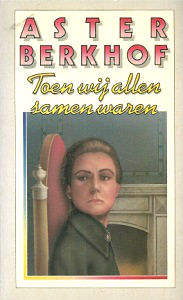
Cover
De Duitse schrijfster en vertaalster Mirjam Pressler werd geboren op 18 juni 1940 in Darmstadt. Zie ook alle tags voor Mirjam Pressler op dit blog. Mirjam Pressler is op 16 januari jongstleden op 78-jarige leeftijd gestorven.
Uit: Dunkles Gold
„Ich war so naiv gewesen. Obwohl mir »naiv« damals als letztes Adjektiv eingefallen wäre, um mich zu beschreiben, ich hielt mich eher für misstrauisch und skeptisch, auf jeden Fall für klug genug, Zusammenhänge zu verstehen und einzuordnen. Trotzdem war etwas geschehen, was ich nicht verstand. Wenn man von früheren Ereignissen erzählt, erkennt man plötzlich Dinge, die man vorher nicht gesehen hat, findet manches wichtig, was man nur nebenbei wahrgenommen hat, oder man stellt fest, dass man sich grundlos aufgeregt oder geärgert hat, Überflüssiges gedacht und getan hat, und dass manches, was einem schrecklich vorkam, im Grunde nur banal war. Oder umgekehrt. Denn in dem Moment, in dem man eine Situation erlebt, ist es unmöglich zu wissen, ob sie später irgendeine besondere Bedeutung haben wird oder nicht. So geht es mir heute, wenn ich an die vielen Streitereien mit meiner Mutter denke, übers Aufräumen, nicht erledigte Aufträge, nicht eingehaltene Versprechungen. Es ist nicht so, dass ich mich jetzt nicht mehr über sie ärgere, aber manchmal denke ich, was soll’s, in einem Jahr sieht alles anders aus. Und ich glaube, meine Mutter empfindet es mir gegenüber ganz ähnlich. Wenn wir uns heute streiten, habe ich oft das Gefühl, als würden wir aus lauter Gewohnheit ein altes Spiel weiterführen, ein Spiel, über das wir manchmal sogar lachen können. Und wir können miteinander sprechen. Das ist erstaunlich, denn ich habe früher sehr wenig gesprochen. »Verschlossen wie eine Auster«, hat meine Mutter oft geklagt, »die Schalen schön fest geschlossen halten. Es könnte ja jemand auf die Idee kommen, sie aufzubrechen, um nach einer Perle zu suchen.« Man weiß auch nicht wirklich, an welcher Stelle der Geschichte man mit dem Erzählen anfangen soll, was nichts mehr mit ihr zu tun hat oder bereits dazugehört. Ich habe beschlossen, mit meiner fixen Idee anzufangen, auch wenn ich nicht sagen kann, wann genau sie entstanden ist. »Wie bist du eigentlich auf diese Idee gekommen?«, hat Alexej mich gefragt, als ich ihm zum ersten Mal einige zusammengeheftete Blätter überreicht habe. Ich habe nur mit den Schultern gezuckt. »Keine Ahnung. Manche Ideen sind plötzlich da, ohne dass man vorher darüber nachgedacht hat, es ist, als wären sie vom Himmel gefallen.« Doch eigentlich glaube ich das nicht. Vermutlich schleichen sich Ideen heimlich ein, sind anfangs nur flüchtige Gedankenfetzen, die aufblitzen und sofort wieder verschwinden, weil sie von anderen Überlegungen verdrängt werden oder sich in ihnen auflösen. Trotzdem bleiben sie in irgendwelchen Winkeln des Gehirns hängen und warten auf eine günstige Gelegenheit, um wieder aufzutauchen.“
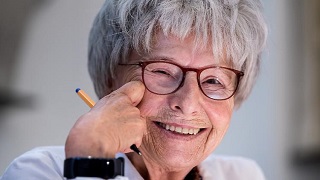
De Russische schrijver Ivan Aleksandrovitsj Gontsjarov werd geboren op 18 juni 1812 in Simbirsk als zoon van een graanhandelaar. Zie alle tags voor Ivan Gontsjarov op dit blog.
Uit: Oblomov (Vertaald door David Magarshack)
“Though the bailiff had written identical letters to his master the year before and the year before that, this last letter had the same strong effect as any other unpleasant and unexpected piece of news. The whole thing was a great nuisance: he had to think of raising some money and of taking certain steps. Still, it is only fair to do justice to the care Oblomov bestowed on his affairs. Already, after receiving his bailiffs first unpleasant letter several years before, he had begun devising a plan for all sorts of changes and improvements in the management of his estate. According to his plan, various economic, administrative, and other measures would have to be introduced. But it was far from being thoroughly thought out, and the bailiffs disagreeable letters went on arriving every year, arousing in him the desire to do something and, consequently, disturbing his peace of mind. Oblomov, indeed, realized very well that he would have to do something decisive before his plan was worked out. As soon as he woke he made up his mind to get up, wash, and, after he had had breakfast, think things over thoroughly, come to some sort of decision, put it down on paper and, generally, make a good job of it. He lay for half an hour, tormented by this decision; but afterwards it occurred to him that he would have plenty of time to do it after breakfast, which he could have in bed as usual, particularly as there was nothing to prevent him from thinking while lying down. That was what he did. After breakfast he sat up and nearly got out of bed; glancing at his slippers, he even lowered one foot from the bed, but immediately put it back again. It struck half-past nine. Oblomov gave a start. `What am I doing?’ he said aloud in a vexed voice. ‘This is awful! I must set to work! If I go on like this — —`Zakhar!’ he shouted. From the room separated from Oblomov’s study only by a narrow passage came what sounded like the growl of a watch-dog on a chain, followed by the noise of a pair of legs which had jumped off from somewhere. That was Zakhar, who had jumped off the stove where he usually sat dozing.”
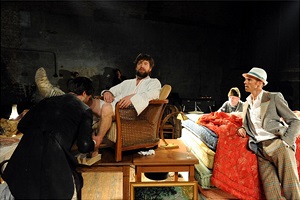
Scene uit een theaterbewerking van “Oblomov”, Mechelen, 2017
Zie voor nog meer schrijvers van de 18e juni ook mijn blog van 18 juni 2016 deel 2.

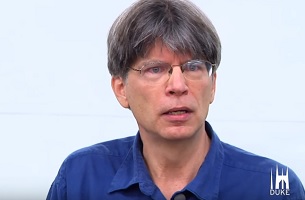
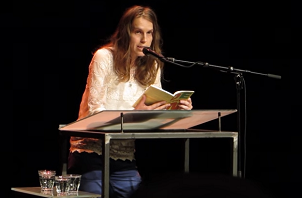
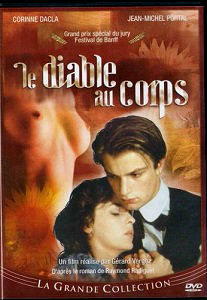
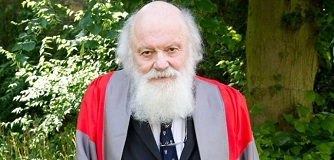
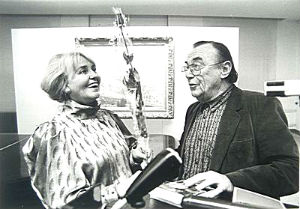
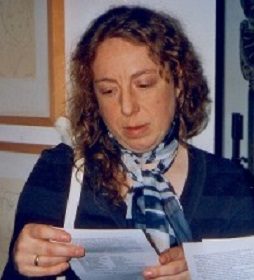

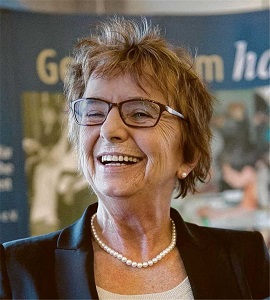
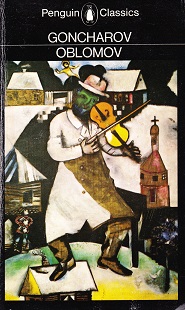
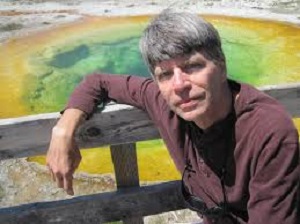
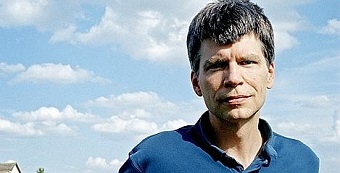
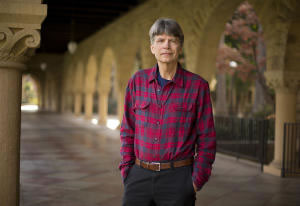
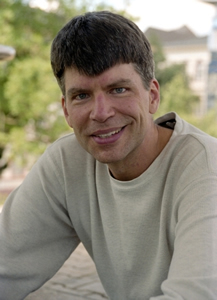
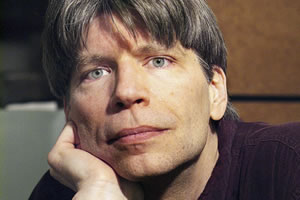
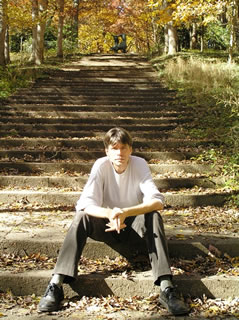

















![hill[1] hill[1]](https://romenu553547602.files.wordpress.com/2008/06/e2f39-dyn003_original_207_300_pjpeg_2535747_7bd7818a803a0b3777f543a3eb5d9d45.jpg)

